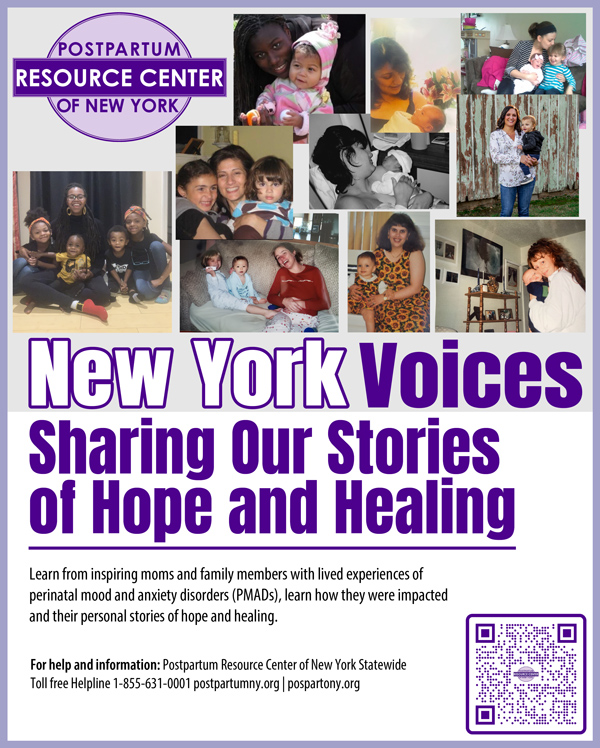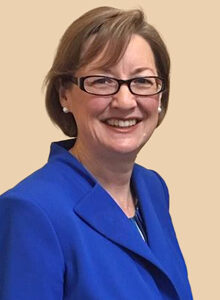Perinatal mood and anxiety disorders, including postpartum depression (PMADs), are the most frequent complication related to childbearing and a leading cause of maternal mortality in New York State.1 PMADs affect up to 20% of birthing persons and new mothers. Also, up to 13% of fathers may experience paternal depression.
In the United States, 50%–70% of women with AND (antenatal depression) or PPD (postpartum depression) are undetected and undiagnosed, and nearly 85% go untreated.2 While undetected, untreated, and under-treated postpartum depression can have a devastating impact on mothers, their infants and children may also be affected. Infants are at increased risk for developmental and motor developmental delays. Untreated, PMADs increase the risk of suicide and infanticide.
Research has shown that women living in poverty are more likely to experience postpartum depression and less likely to receive care. Women of color are at higher risk for postpartum depression due to racism, social determinants of health, and cultural stigma.3 Underserved families, such as refugees/immigrants and other racial groups, are in need of culturally sensitive, quality maternal mental health resources.
Children of mothers with PMADs are more likely to experience mental health concerns, learning disabilities, cognitive impairment, conduct/behavioral issues, and/or developmental delays. Mothers are reluctant to discuss changes in mental health due to shame, fear that their child(ren) will be removed from their care, substance and alcohol abuse, trauma, and distressing interactions with professionals. The availability of peer support and education lessens stigma and increases help-seeking behaviors.
In an effort to decrease and eliminate preventable maternal mortality and the adverse effects of untreated parental mental illness on parents and their infants and children and our society, it is critical to increase New York State families getting to the help they need for the prevention and early identification and treatment for the recovery of perinatal mood and anxiety disorders (PMADs).
Furthermore, for the prevention of the detrimental effects of undetected, untreated, and undertreated perinatal mental health conditions, the inclusion of peer support should be considered.4
The Parental Mental Health Peer Support Program, developed by the Postpartum Resource Center of New York, was created to address the critical need for the availability of peer support for families at risk for or experiencing perinatal mental health conditions. PRCNY’s peer support program leverages a team of trained Peer Coaches with lived experience of PMADs who offer multiple channels of peer support to parents-to-be, parents, and their families. The result is that barriers of stigma are reduced and access to quality care is increased.
The Parental Mental Health Peer Support Program’s mission is to increase awareness and improve access to quality care for New York State families at risk or experiencing a perinatal mood and anxiety disorder, including maternal/postpartum depression. Peer support reduces stigma and increases the number of mothers and fathers seeking and receiving help. A special emphasis in this program is on increasing the provision of services to those New York families that are underserved or disadvantaged from various socioeconomic backgrounds.
The Parental Mental Health Peer Support Program is expanding the programs and services of the Postpartum Resource Center of New York statewide. The program includes providing for free to families: peer to peer nonjudgmental emotional support via a 7 day a week, state-wide toll free helpline, numerous weekly virtual support groups and support meetings, twice weekly check-ins, weekly Peer Chat sessions, and educational information/awareness materials to pregnant women, moms, dads and service providers (maternity hospitals and health clinics) and healthcare and support group resources.
The Program includes providing peer support and closing gaps for high-risk populations, including: Finding the Help You Need Support Meeting, and What I Need to Know Virtual Class. For Spanish-speaking families, there is the Seguimos Adelante Groupo de Apoyo (We Keep Moving Forward) support group, for Black/African American moms-to-be and moms there is EMERGE, and for dads-to-be and fathers there is Support for Dads Groups and Dad on Call telephone support. There is also support provided to military families and those impacted by Perinatal Psychosis and Parenting with a psychiatric disability.
Family members are offered to meet with the Peer Team for emotional support, education, and perinatal mental health resources at free virtual Take Care of You Family Support Meetings. Family members have reported back to the Postpartum Resource Center of New York that many times these meetings are a turning point in understanding of PMADs, have increased partner communication, and have increased getting the help that is needed.
“The Take Care of You family meeting was the turning point for all of us having a better understanding how to support my wife and take care of myself and family as she recovered from postpartum psychosis. I don’t want to think where we would be without finding the Postpartum Resource Center of New York.” – A grateful new parent
Besides offering support from Peers themselves, there is also an educational component with a growing Learning Collaborative Community. The Postpartum Resource Center of New York had a unique opportunity to continue hosting the well-attended Moving on Maternal Depression Webinar Series (MOMD) that has been offered in collaboration with the Schuyler Center for Analysis and Advocacy. This webinar series is an important part of the Parental Mental Health Peer Support Program. The series helps to make the connection for increasing knowledge on the need for inclusion of Peer Support. Topics addressed include challenges of connecting with perinatal populations due to stigma of mental illness and combating lack of knowledge of perinatal/parental mental health.
The Learning Collaborative Community is also able to engage and learn from each other, closing the gaps in care by highlighting models of treatment and support for perinatal mental health in New York and sharing best practices including on the inclusion of Perinatal Mental Health Peer Support throughout New York State and other states.
The Moving on Maternal Depression Webinar Series is increasing knowledge for the prevention, screening, treatment, and support services for perinatal mental health. The MOMD series is also increasing specialty and culturally appropriate, trauma-informed care resources to reduce health and racial disparities. It is further increasing access to quality care for New York families who are underserved and disadvantaged from varying socioeconomic backgrounds, especially those at high risk or experiencing a perinatal mood and anxiety disorder.
With the identification and development of new resources (including multilingual, culturally and economically appropriate resources), the PRCNY’s on-line State-wide Perinatal Mood and Anxiety Disorders Directory continues to be expanded to offer additional resources with special attention to address racial and health equity and access to care.
The availability and support of the Postpartum Resource Center of New York’s Parental Mental Health Peer Support Program is enhancing professionals and community support programs to have greater ease in screening and asking of parents-to-be, mothers, and fathers about their mental health.
In conclusion, the need for awareness, prevention, education, and early intervention in perinatal mood and anxiety disorders (PMADs) remains of critical importance to reduce stigma, increase access to care, and to prevent suicide and infanticide. The Postpartum Resource Center of New York’s Parental Mental Health Peer Support Program has demonstrated through its statewide implementation and expansion, that through peer support there can be a reduction in stigma, increased access to quality care, and vital tools provided for families and healthcare providers to increase connection to treatment and support for help to save lives.5,6,7
“The program in general has been absolutely critical to my healing. The meetup was extremely helpful because I heard other women speaking the thoughts and feelings I was having. I thought these were specific to me and I thought I was alone and broken, but knowing so many were having the same experience was comforting, and I felt so much support and reassurance in that I wasn’t alone.” – PRCNY Parental Mental Health Peer Support Program Mom
Acknowledgment: Thank you for the generous support of the Mother Cabrini Health Foundation.
Sonia Murdock, PMH-C, is the Executive Director of the Postpartum Resource Center of New York, Inc. She can be reached at sonia@postpartumny.org or by phone at (631) 422-2244.
References
- 2023 New York State Maternal Mortality and Morbidity Advisory Council Report
- Cox, E. Q., Sowa, N. A., Meltzer-Brody, S. E., & Gaynes, B. N. (2016). The perinatal depression treatment cascade: baby steps toward improving outcomes. The Journal of clinical psychiatry, 77(9), 20901.
- Taylor, J. & Gamble, C.M. (2017, November). Suffering in Silence: Mood Disorders Among Pregnant and Postpartum Women of Color. Center of American Progress.
- Policy Center for Maternal Mental Health (April 2023) Issue Brief: A Significant Solution for Maternal Mental Health: Certified Peer Specialists.
- Murdock, S. (2024, June 6) Voices of Hope & Healing: Parental Mental Health Peer Support Program for New York Families [Conference presentation]. New York State Perinatal Association 2024 Conference, Albany, New York.
- Murdock, S. (2024, July 24) Infusing Peer Support into Practice [Workshop presentation]. 37th Annual Postpartum Support International Conference, Washington, DC.
- Murdock, S. (2025, June 12) Voices of Hope & Healing: Parental Mental Health Peer Support Program for New York Families [Poster presentation]. New York State Perinatal Association 2025 Conference, Albany, New York.





